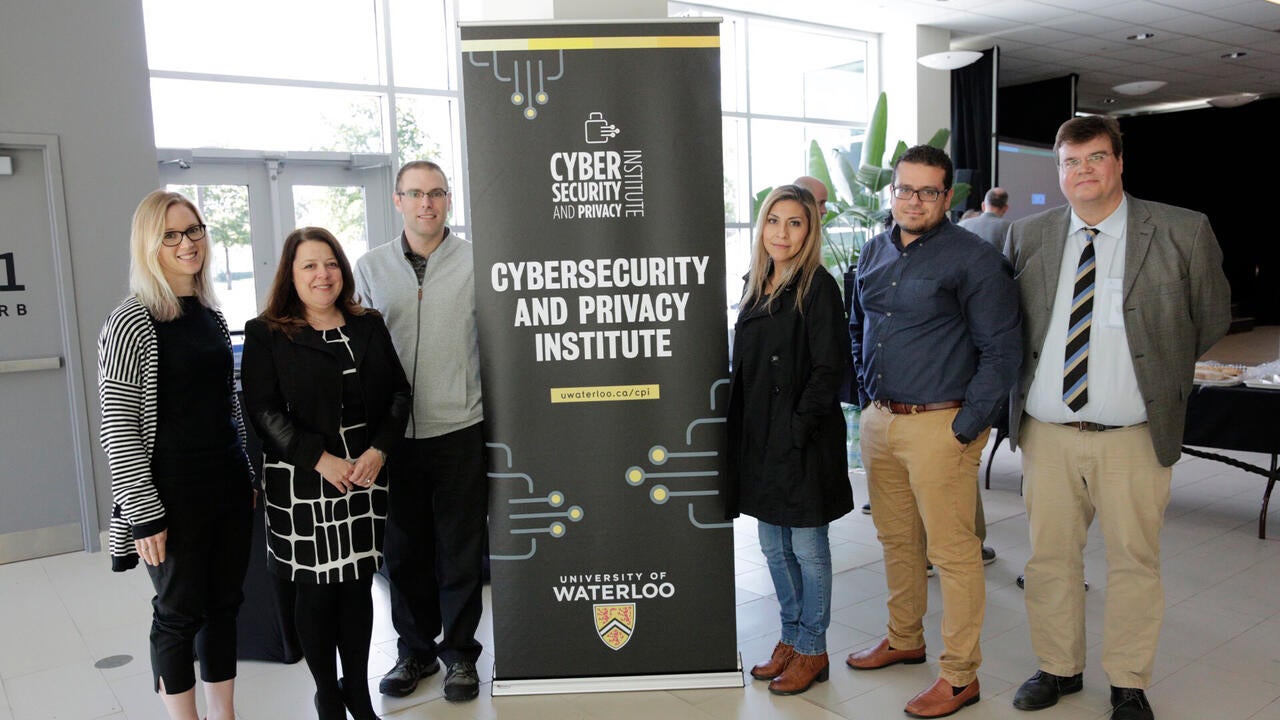
Waterloo launches the Cybersecurity and Privacy Institute
Bringing together researchers from across Waterloo’s six faculties.

Bringing together researchers from across Waterloo’s six faculties.
By University Relations and MathematicsOn Friday, September 28, Waterloo celebrated the launch of the Cybersecurity and Privacy Institute (CPI) with 100 attendees including security leaders from the private and public sectors. CPI was formed to uncover new approaches to security and privacy and educating Canada’s future leaders to be able to understand and respond to emerging online threats.
Cybersecurity and privacy are pressing problems in the digital systems that surround our everyday life. Repeatedly, news is reported about vulnerabilities and exploits on the Internet, social networks, mobile computing, cyber-physical systems, artificial intelligence and critical infrastructures. The Institute will work closely with corporations and government to advance their cybersecurity and privacy protection capabilities.
“The global economy relies on safe and secure digital systems,” said Charmaine Dean, vice-president, research. “The launch of the Cybersecurity and Privacy Institute comes at a critical time when we need concerted efforts in developing new cryptographic methods and in training highly skilled personnel who can support communities in the mission-critical nature of cybersecurity and privacy.”
Keynote speaker, Christine Binne, serves as the director of policy and issues management at the National Cyber Security of Public Safety Canada. She has facilitated a comprehensive review of the cyber strategy for Canada and notes that her research has found there is serious concern about the rising threat of cybercrime. Binne is optimistic that collaborations with institutes like CPI can help find solutions. “I am excited about the important contribution this institute will make for Canada.”
Read individual Tweet on Twitter
CPI follows an interdisciplinary, scientific approach to develop solutions to the fundamental problems that have the potential to change the landscape of cybersecurity. The institute brings together 88 researchers from across Waterloo’s six faculties to bundle their research activities on cybersecurity and privacy across all disciplines. Binne notes that cybersecurity is a multidisciplinary problem and CPI’s approach can help “bridge the gap between STEM fields and other disciplines.”
"The saying, a chain is only as strong as its weakest link is as true in cybersecurity and privacy as it is anywhere. With key ingredients ranging from mathematical theorems to human elements, the challenges are inherently interdisciplinary," said Stephen M. Watt, dean of Mathematics. "Our research strengths position Waterloo uniquely to make Canada a global leader in the research, development and deployment of cybersecurity and privacy solutions."
Read individual Tweet on Twitter
The institute will partner university researchers with companies to solve cybersecurity and privacy challenges. “We are fortunate to have strong corporate partners to help advance this research,” said Florian Kerschbaum, a computer science professor and director of the Cybersecurity and Privacy Institute at the University of Waterloo.
RBC has four large cybersecurity research projects already underway at Waterloo which total more than $2.2 million, and they are creating an RBC lab for cybersecurity and partnership collaborations on campus. They have supported the CryptoWorks21 graduate program for cryptography, including quantum-safe cryptosystems.
Symcor was announced as the founding partner of the Cybersecurity and Privacy Institute at the University of Waterloo. The sponsorship is part of Symcor’s commitment to Business-to-Industry (B2I) solutions facilitated through a powerful and collaborative network. Symcor is a change accelerator helping customers effect their digital transformations to enable financial institutions to respond rapidly to the changing face of fraud.
Read individual Tweet on Twitter
Part of the mandate of the Cybersecurity and Privacy Institute is to educate Canada’s future leaders in these fields. The institute will prepare highly qualified graduates at a time when demand exceeds the supply of cyber talent. Binne notes that, “there is a skills shortage in cybersecurity.” CPI is seeking to fill this gap.
Many graduate students were on display at the CPI launch, partaking in a poster session. Attendees had the opportunity to meet these future cybersecurity leaders and hear about their research.
The launch event was structured to provide a learning opportunity for everyone. Attendees heard from Waterloo faculty, researchers and industry thought leaders who led panel discussions around research happening in two key areas: post-quantum security and the Internet of Things (IoT) security.
Read individual Tweet on Twitter
Echoed by many of the panelists, there is still so much uncertainty when it comes to digital security and the growing connectivity of all our devices. CPI hopes to develop solutions to these fundamental problems that have the potential to change the landscape of cybersecurity.

Read more
Here are the people and events behind some of this year’s most compelling Waterloo stories

Read more
It Started in Waterloo: An Astronaut's Journey into the Universe of Innovation, narrated by Chris Hadfield, highlights the University of Waterloo’s role in igniting innovation within the region and beyond.

Read more
Velocity’s $10K Momentum Grants help student builders become full-time founders
The University of Waterloo acknowledges that much of our work takes place on the traditional territory of the Neutral, Anishinaabeg, and Haudenosaunee peoples. Our main campus is situated on the Haldimand Tract, the land granted to the Six Nations that includes six miles on each side of the Grand River. Our active work toward reconciliation takes place across our campuses through research, learning, teaching, and community building, and is co-ordinated within the Office of Indigenous Relations.